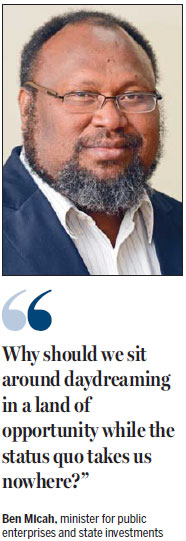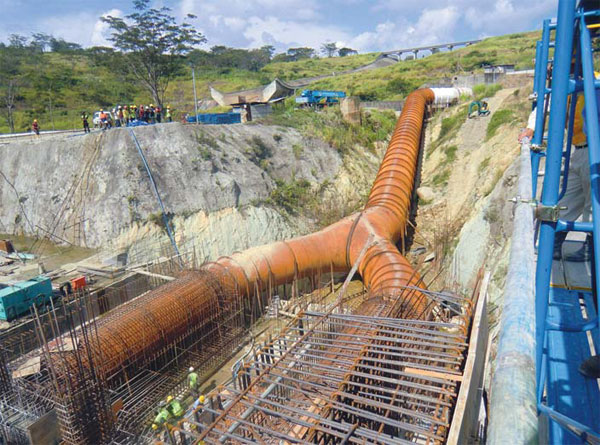Chinese relations look set to strengthen
|
Papua New Guinea expects to change its landscape by attracting foreign investment to its infrastruture sector. Provided to China Daily |
More involvement expected from China with abundant upcoming infrastructure projects
Editor's note: In an interview, Ben Micah, minister for public enterprises and state investments, explains more about Papua New Guinea and the many opportunities happening on the ground.
China has reaffirmed its commitment to investing in PNG over the long term, and the country has become the prime beneficiary of soft loans distributed by China to South Pacific nations. An example of that commitment is the $2.7 billion loan granted by Exim Bank to further develop infrastructure and other sectors of the economy. Please comment on the momentum of China-PNG bilateral relations.
The Chinese have been very solid friends with PNG since diplomatic relations were established almost 40 years ago. China has played quite a significant role within that period to assist PNG in many forums in the UN and in regional cooperation, and helped us fund agriculture and build a stadium for the 1991 Pacific Games.
Since then, China's influence in the world has grown significantly, and also our relationship with them has increased to cover areas of economic, education and cultural cooperation. Large investment by Chinese companies like Ramu Nico in the mineral sector, BNBM in trading and the entry of China Railway, China Harbor, COVEC, CMEC and Sinohydro in infrastructure development, and Huawei and ZTE in telecommunications, have had a tremendous impact on our economy.
China is a large buyer of our liquefied natural gas. All our log exports are destined for China. Both Exim Bank and the China Development Bank are vying to finance large projects in many sectors. We have small and medium-sized companies, as well as individuals and families doing business here that are contributing to the increasing trade between China and Papua New Guinea.
You have previously stated that "the government alone is incapable of meeting legitimate development expectations, therefore the private sector will be a partner with us". More than 20 Chinese firms are established in PNG's infrastructure development and property construction. How do you see the future of public-private partnerships with Chinese companies?
That's the only way we can attract the transfer of capital, technology and expertise without exposing ourselves to too many loans to foreign banks and financial institutions. I am encouraging partnerships between our state-owned enterprises and Chinese SOEs in the construction of hydropower dams, transmission lines, telecommunication infrastructures, seaports and airports.

The advantage of dealing with Chinese companies is that they have both the financial, logistical and manpower capacity to deliver any size of project within time and on budget. I can cite as an example the major development of the Lae port by China Harbour that is ahead of schedule.
Competition is the driving force behind economies, while efficient and fair markets are essential for economic growth. What fiscal incentives and competitive packages are being offered to enable an increase within these sectors?
Unlike 10 or 15 years ago, doing business in Papua New Guinea has become very competitive for foreign investors and service providers. I am amazed at the number of foreign companies in all sectors, from oil, gas, mining, agriculture, fisheries, tourism, energy and telecommunications, making enquiries at the Independent Public Business Corporation - or IPBC - and the Department of Public Enterprise and State Investments about investment opportunities.
This competitive tension will deliver the best outcome for both the country and the foreign investors. With the exception of doing business within a declared special economic zone, there is no sense in giving fiscal incentives in an economy that is growing at the rate we are. The rate of return on investment is the key. Whoever offers a competitive price, makes a profit and still delivers the best outcomes that we require gets the job and over time will appreciate the greater benefits of doing business in our country.
The staging of international events, such as the Pacific Games in July and the APEC Summit in 2018 will bring the world's eyes to the islands. Since the major infrastructure agencies are under your ministry, how are you ensuring the highest international quality standards are met?
We are ready. Some of the work is being undertaken by China Railway and China Harbour, while other locally based companies, such as Curtain Bros, Fletcher Morobe and others from New Zealand and Australia are also engaged in developments in Port Moresby.
The government has set an ambitious plan to transform the capital within the next five years so that come APEC in 2018, Port Moresby will define and showcase to the world the achievements of our country. State-owned enterprises, like PNG Ports Corp, PNG Power Ltd, PNG Telekom and EDA Ranu are at the forefront of this challenge.
Last year you announced reforms in the ministry that are intended to ultimately raise living standard of Papuans by improving the quality of services, limiting costs and repairing, maintaining and expanding PNG's national infrastructure. Would you consider yourself a revolutionary?
Of course I am a revolutionary when it comes to initiating and effecting change for the better. Why should we sit around daydreaming in a land of opportunity while the status quo takes us nowhere?
I drove the constitutional changes that reformed the provincial and local-level government system from 1992 to 1997 as chairman of the Constitutional Review Commission. This has enabled planning, budgeting and implementation to be decentralized to districts and local-level governments. The government is now focusing on developing the rural areas of the country.
I am determined to revolutionize and transform PNG by strategically aligning SOEs with private sector partners to allow the flow of foreign capital and technology transfer that will revolutionize our energy, telecommunication and air and sea port infrastructure that will result in creating the platform for transformational change in all other sectors of the country. There is nothing impossible when we have the will and determination to do something. And there is no better country in the Asia-Pacific region that has all the ingredients of successful transformation than PNG in our time.
The IPBC was established as a successor organization to the privatization commission. Its intention was to hold the state's interests in all fully corporatized companies and manage their transition towards full or partial privatization. It is a trust organization established by an act of parliament and does not have a clear mandate to operate as a holding company to directly manage the operations of SOEs.
InFocus provided this story.
(China Daily 06/29/2015 page20)















